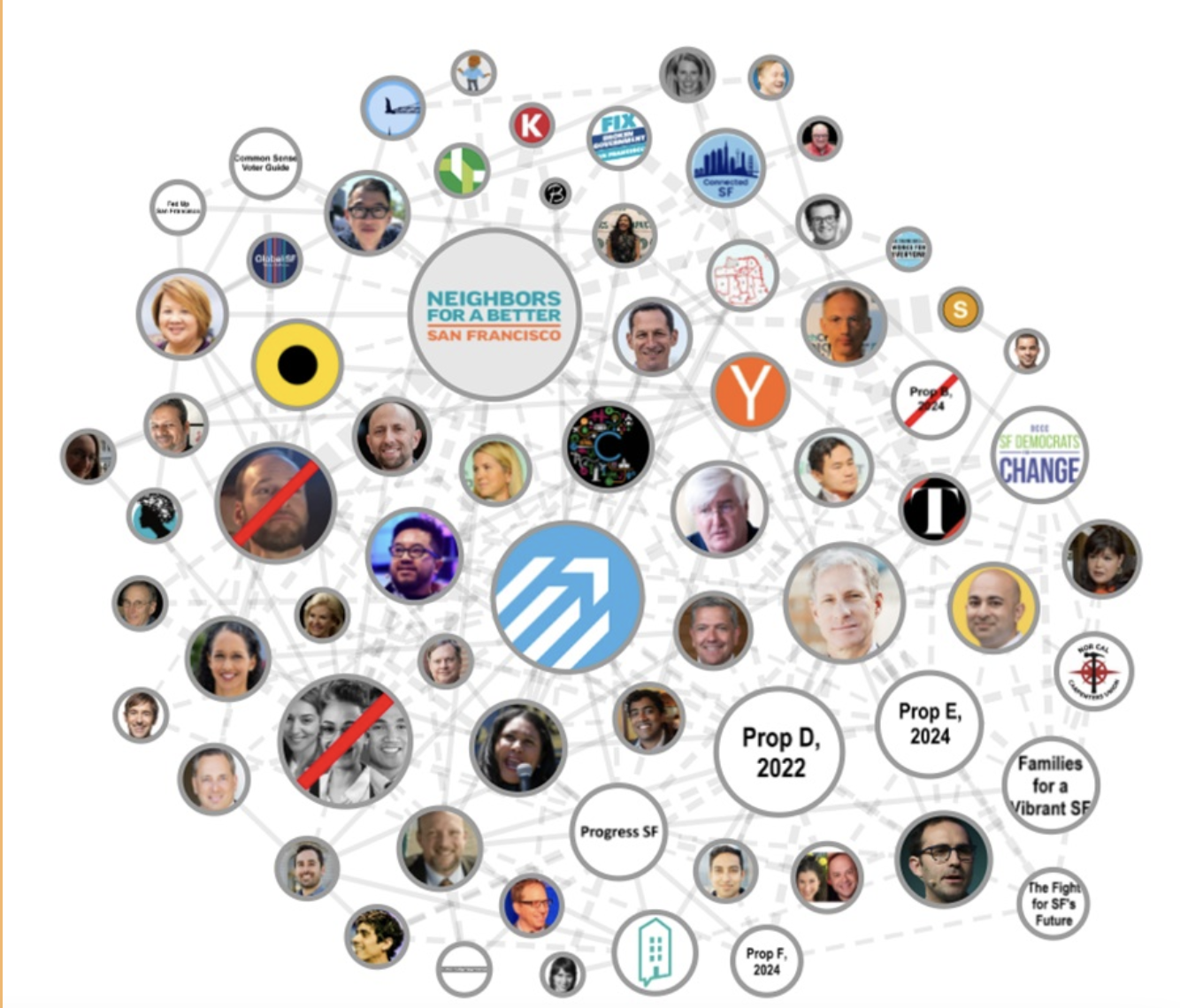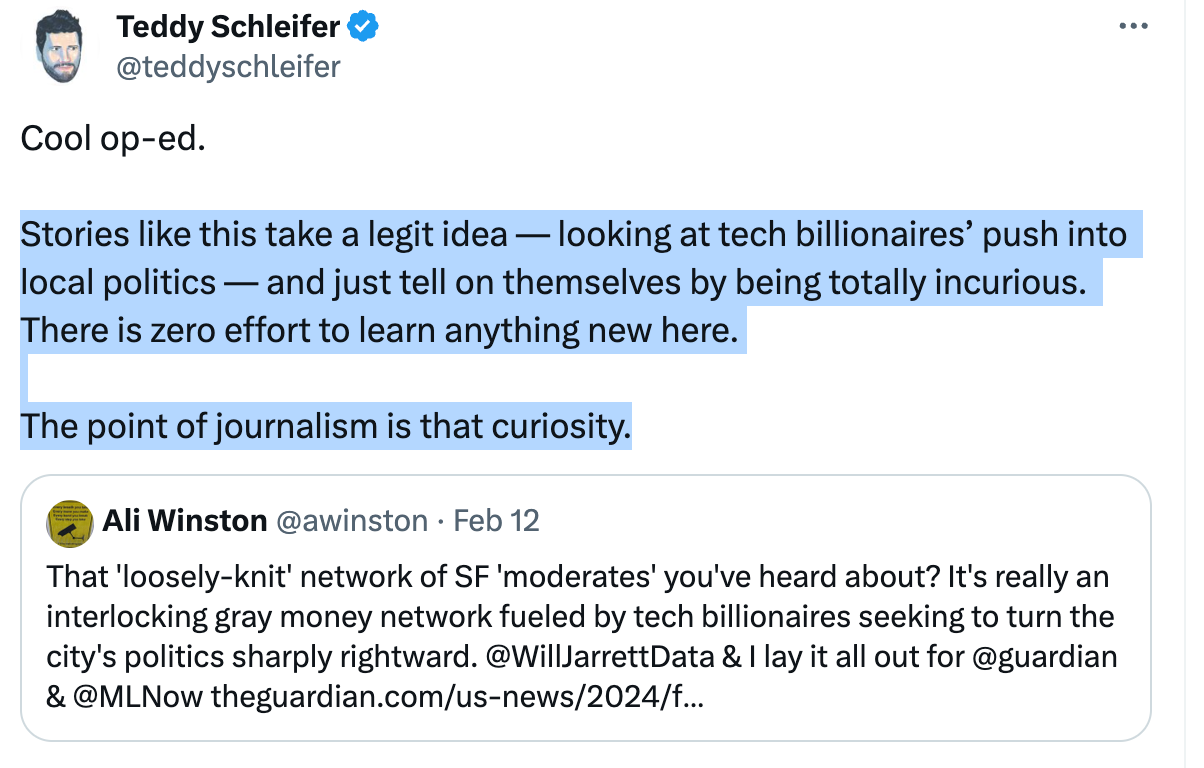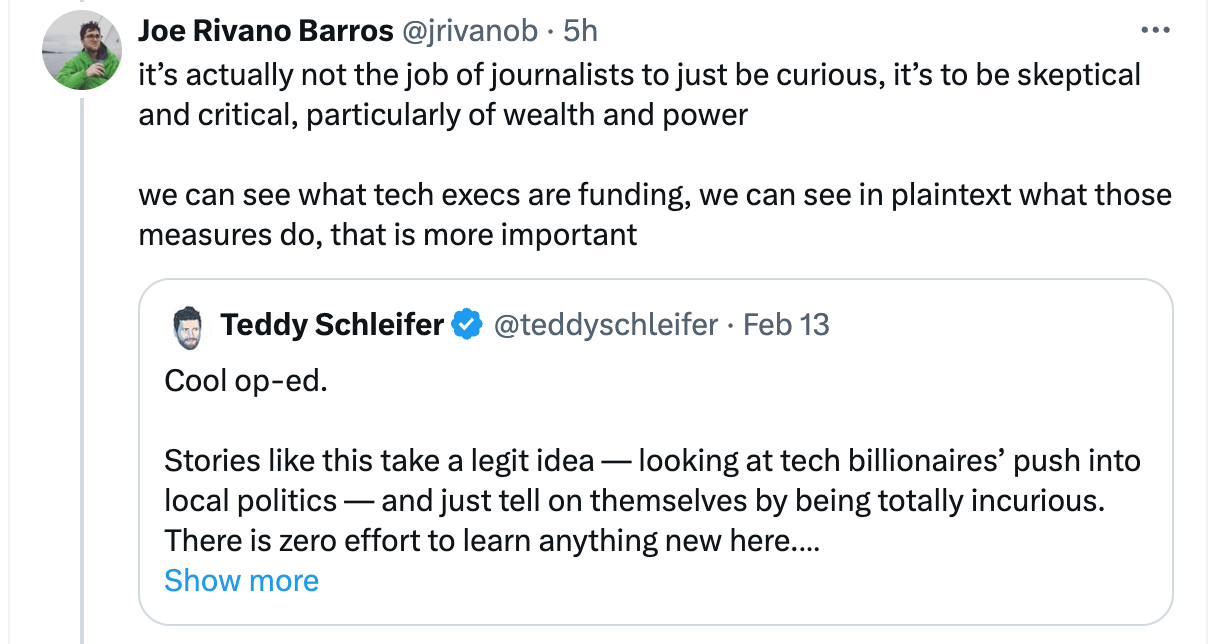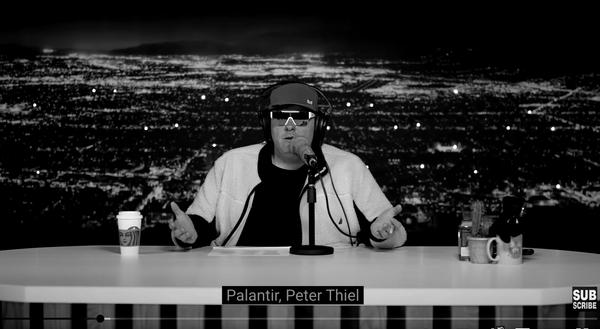Cat Fight: The problem of 'parallel' journalism

The point: We may be seeing the emergence of a new strategy in which certain kinds of "journalists" go on the attack against other journalists who report on billionaires. Expect this trend to continue as billionaires continue to fund new forms of "parallel media," wholly dependent on them, with the purpose of undermining existing media outlets.
The back story: On Monday, Mission Local and The Guardian dropped a joint investigation that sheds light on how tech billionaire "gray money" is flooding San Francisco politics.
This is a familiar type of public service journalism by two highly credible media outlets. It illuminated where the money is flowing and how it's being used to push tech's political agenda. It even featured a nifty visualization to illustrate the people, the nonprofits and the money trails in local politics (click image to check it out!):

Coincidentally, this project published on the very same day that the New Republic published my piece on how San Francisco tech CEOs are using their money to impose a reactionary agenda on the city. Their agenda entails the creation of "parallel" media and political organizations to help further its cause. Garry Tan, the Y Combinator CEO who was (until recently) the lead spokesman for this agenda, pointed to Elon Musk's Twitter as an example of a victory for this "parallel" movement.
These works of journalism got a good amount of attention online, dominating the hyperlocal political X-Twittersphere for the day. You can read them here:
BigMoneySF: Explore the players paying out to remake San Francisco, Will Jarrett, Mission Local
Inside tech billionaires' push to reshape San Francisco politics, Ali Winston, The Guardian
The Tech Plutocrats Dreaming of a Right-Wing San Francisco, Me!, New Republic
Unsurprisingly, these pieces came under attack from the usual suspects: Local tech bro types and well-known local social media trolls who pay for Twitter blue checks, etc. But in a very interesting development, they also sparked some highly unusual attacks from supposed fellow journalists.
It started with a snarky tweet from Teddy Schleifer of Puck, a glitzy flash-in-the-pan newsletter that purports to cover everything from Hollywood to Silicon Valley to Washington to Wall Street. (The New Yorker described it as "The Email Newsletter of the Mogul Set")
"Stories like this take a legit idea — looking at tech billionaires’ push into local politics — and just tell on themselves by being totally incurious," tweeted Schleifer, in response to a tweet by Ali Winston, who co-authored the Guardian/Mission Local project. "There is zero effort to learn anything new here. The point of journalism is that curiosity."

Now, Schleifer's tweet really provoked my curiosity. Why would a journalist who purports to cover the intersection of billionaires and politics try to take a public a dump on other fellow journalists for doing just that? My first thought was that perhaps he was just jealous to see his local competitors getting attention.
Yet that's not what happened here. In subsequent tweets, Schleifer continued to question the value of the reporting by both Mission Local and the Guardian, insisting that the information did not qualify as actual news. The tech bro Twitter blue checks began liking and sharing Schleifer's tweet after it was reposted by – wait for it – Garry Tan (the guy at the center of the whole billionaire-funded effort).
Schleifer, who is supposed to be covering the billionaires, seemed to be caping for the billionaires, with their enthusiastic support. This made me even more curious – about who, exactly, is funding Puck. And, lo and behold:
"Puck, the buzzy media startup that covers the intersection of Hollywood, Silicon Valley, Wall Street and Washington, has raised over $10 million in a Series B growth round," reported Axios in August. "The round, which closed last week, was led by British investment firm J Rothschild Capital Management, which invests in startups across industries, including crypto, fintech and entertainment...Puck's two existing investors — Standard Investments, an investment arm of Standard Industries, and private equity giant TPG — both participated in the round."
Sadly, despite this infusion, it appears Puck is not yet profitable (relatable). Every outlet needs money. But if I worked for a company that was literally begging billionaires for cash, I'd avoid trying to take a public dump on the credibility of reporters doing crucial work in the non-profit model. (For the record, I'm a fan of Julia Ioffe and Baratunde Thurston, who both write for Puck. Hope it works out!)
Oh, but the parade wasn't over yet. The next day, a tech-beholden Substacker in Brooklyn decided to weigh in, too.
"One moment the tech elite is too aloof about how their hometown operates, the next they're a gray money cabal," sneered Eric Newcomer, who writes insider-y essays about "top startups and venture capital." "Also the idea that Gary Tan is in any way trying to obscure' that he's trying to influence SF politics is absurd." (Editor's Note: It's spelled "Garry.")
In December, surprise surprise, Newcomer interviewed Tan on his predictions for 2024. The interview is behind a paywall, but we can assume that "getting drunk and making death threats to local politicians" wasn't on his Nostradamus list.
Mike Ege, most recently of the billonaire-owned San Francisco Standard, tried to jump into the fray as well.
"It's about time someone said something," he tweeted. "Most campaign finance reporting has a breathlessly meretricious tone implying that publicly available information is some big secret."
Well – finally! – someone speaks up in defense of big money in politics! (and uses "meretricious" in a sentence.)
Local journos fired back.
"It takes a particular kind of reporter to pooh-pooh the notion that we should critically examine tech execs’ political giving & policy desires," replied Joe Rivano Barros of Mission Local. "This was a reaction from not a few tech reporters who cover these guys, it’s baffling & speaks poorly to their journalistic appetites."

Final Thought for Today: There's an old saying in journalism: Access journalism is Ass-Kiss journalism.
Actually, I think I just made that up. But really: How odd for a bunch of reporters with zero profile in S.F. politics to pop up attacking well-known local journalists for doing their jobs. (In my experience, we journalists pan each other's work by simply not acknowledging it.)
It's also strange to see these journalist-on-journalist attacks quickly amplified by the tech plutocrats' army of blue-checked flying monkeys (with the exception of Ege, who apparently didn't make the blue check cut yet). Doesn't seem totally organic to me.
Then, there's the strategy. These critics sought to minimize the stories by making it seem as if tons of billionaire money flooding into local politics are simply beneath public interest. Weird position for a journalist.
Putting on my old P.R. hat: These attacks will only elevate these stories and create further interest in them.
Too early to call it a trend, but let's keep an eye out as the billionaires continue to hatch their own "parallel" media world ... while they also cultivate susceptible access-hungry or capital-dependent scribes to do their bidding by attacking the real journalists whom they fear.
(As this was being published, further anti-journalist journalism pieces emerged, enjoying retweets from far-far-right fever swamp figures ... more to come.)





